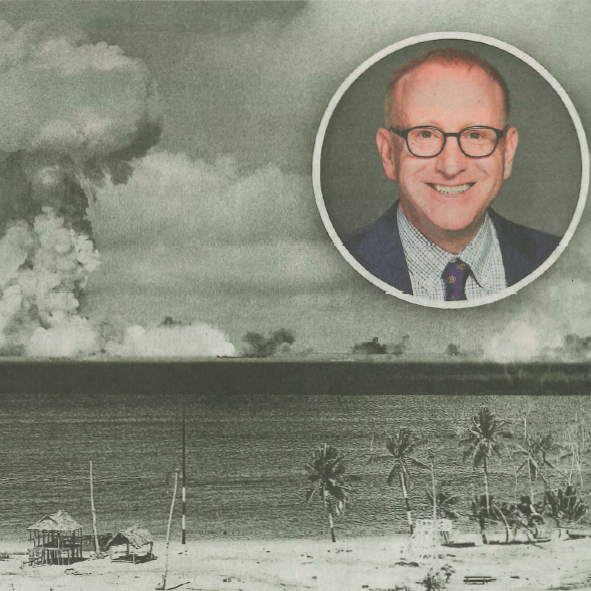European Nuclear Study Group


The University of St. Gallen‘s Institute of Political Science (IPW-HSG), the Munich Security Conference, and the Centre for International Security at the Hertie School (Berlin) have jointly launched the European Nuclear Study Group (ENSG). The first meeting of the ENSG will take place during the 60th Munich Security Conference, which will be held from 15-18 February 2024.
The threat of nuclear escalation has returned to the top of the Euro-Atlantic security agenda. Russia’s full-scale invasion of Ukraine definitively ended the comparatively peaceful post-Cold War era, which gave rise to the goal of achieving international stability with fewer nuclear weapons. Russia’s nuclear saber-rattling and unilateral suspension of New START are the most obvious indications that the nuclear order is under extreme stress. However, significant longer-term geopolitical and technological changes are eroding the traditional bases of the nuclear balance that has contributed to international stability since the 1950s. The nuclear order has become more complex, with strategic stability not only a function of US and Russian arsenals but increasingly trilateral, as China rapidly expands its own nuclear arsenal. The situation is further complicated by disturbing developments in several regional sub-theaters, changes in the global information ecosystem, and increasing doubts about political developments in various states that either already possess nuclear weapons or are striving to acquire them.
As we confront new realities, it is necessary to review and where necessary reconceive the requirements for successfully deterring the use of nuclear weapons. In the US, a vibrant discussion is underway. The European Nuclear Study Group brings together a new generation of scholars and practitioners to focus on the implications of the changing nuclear order for Europe, in particular, for strategic doctrine, nuclear modernization, arms control, and transatlantic cooperation.
Prof. James W. Davis, Ph.D. (University of St. Gallen), Dr. Tobias Bunde (Munich Security Conference & Hertie School), and Dr. Claudia Major (Stiftung Wissenschaft und Politik, Berlin) will serve as Co-Chairs of the European Nuclear Study Group, which aims to present a report on its initial findings at the Munich Security Converence in February 2025.
Camille Grand is a Distinguished Policy Fellow at the European Council on Foreign Relations (ECFR) since November 2022, where leads the organisation’s initiative on defence and security. He was previously the Assistant Secretary General for Defence Investment at NATO (2016-22) and the director of the Fondation pour la recherche stratégique (FRS, 2008-16). He has also held senior positions in the French Ministries of Foreign Affairs and Defence and worked as a researcher inter alia at the EU Institute of Security Studies (EU-ISS) and the Institut français des relations internationales (IFRI). He is also lecturing graduate courses at the Paris School of International Affairs (Sciences Po Paris), and taught at the Ecole nationale d’administration (ENA) and the French army academy.
Janina Dill is the Dame Louise Richardson Chair in Global Security at the Blavatnik School of Government at the University of Oxford, a Professorial Fellow of Trinity College Oxford, and Co-Director of the Oxford Institute for Ethics, Law, and Armed Conflict (ELAC). Her research concerns the role of law and morality in war. She currently co-convenes (with Scott Sagan) a research project on the "Law and Ethics of Nuclear Deterrence," which is part of the Research Network on Rethinking Nuclear Deterrence, funded by the MacArthur Foundation
Marina Henke is Professor of International Relations at the Hertie School in Berlin (Germany) and the Director of the Hertie Centre for International Security. She researches and publishes on grand strategy, nuclear security, and European security and defense policy.
Liviu Horovitz is a research associate at the German Institute for International and Security Affairs (SWP) in Berlin. He works primarily on nuclear deterrence but is also interested in great power politics and transatlantic relations. Liviu received a PhD from ETH Zurich and his most relevant work has been printed or is forthcoming, for example, in Journal of Cold War Studies, Washington Quarterly, or Journal of Strategic Studies.
Łukasz Kulesa is Deputy Head of Research Office at the Polish Institute of International Affairs (Warsaw), where he directly supervises the institute’s research on international security, transatlantic relations, Russia and Eastern Europe. His areas of expertise include nuclear and conventional deterrence, arms control, NATO, Russian security policy, nonproliferation of weapons of mass destruction, and the transatlantic security relationship.
Dr. Andreas Lutsch is a historian and Junior Professor of Intelligence Analysis in the Faculty of Intelligence at the Federal University of Applied Administrative Sciences, Berlin. In his research he concentrates on problems and methods of strategic foreign and military intelligence assessment and on the history of nuclear deterrence and nuclear order, with a focus on the status, position and preferences of the Federal Republic of Germany. Dr. Lutsch was a Stanton Postdoctoral Nuclear Security Fellow at Stanford University, has taught at the universities of Mainz, Würzburg, Stanford, Sciences Po Paris, and the University of Potsdam, and contributes to executive education programs.
Michal Onderco is Full Professor of International Relations at Erasmus University Rotterdam. His main interest lies in the institutional structures for governing international security, including their origins and functioning. He obtained his PhD in political science from Vrije Universiteit Amsterdam in 2014. He is the author of ”Networked Nonproliferation” (SUP, 2022).
Kristin Ven Bruusgaard is currently Director of the Norwegian Intelligence School. She served as the Deputy Chief of the Norwegian Defense Commission 2021-2023, providing advice on future Norwegian security and defence policy. She is an expert on Russian nuclear strategy and European security, including the High North.
Lauren Sukin is an assistant professor of international relations at the London School of Economics and Political Science. She is a non-resident scholar at the Carnegie Endowment for International Peace and an affiliate at the LSE Phelan United States Centre as well as Stanford University's Center for International Security and Cooperation. She holds a PhD and MA from the Department of Political Science at Stanford University and ABs from the Department of Political Science and Program in Literary Arts at Brown University.